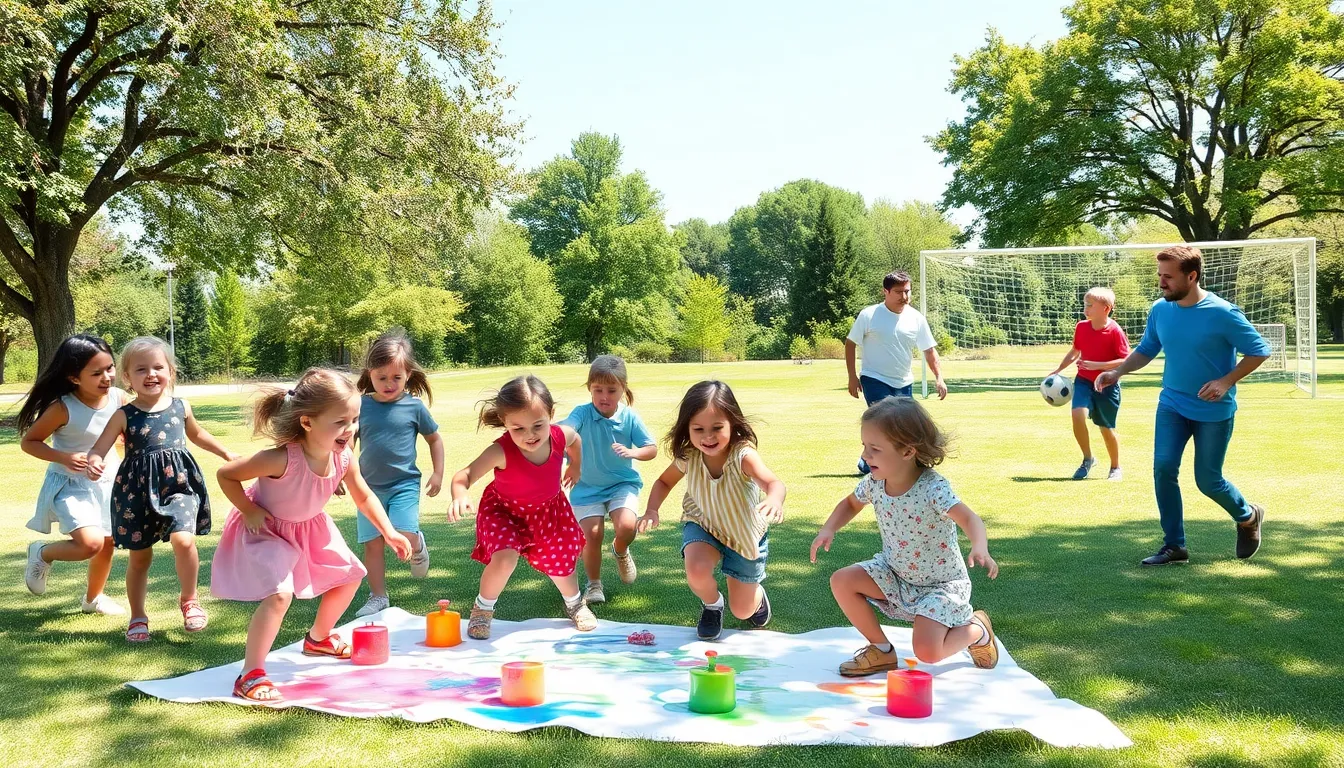Table of Contents
ToggleIn a world that often prioritizes productivity over pleasure, playtime emerges as the unsung hero of our daily lives. It’s that magical moment when adults can channel their inner child, and kids can unleash their wild imaginations. Whether it’s a game of tag in the backyard or an epic board game showdown, playtime isn’t just fun—it’s essential for creativity and well-being.
Think about it: when was the last time you let loose and just played? If the answer involves a Netflix binge, it’s time to shake things up. Embracing playtime can lead to laughter, connection, and even a boost in mental health. So grab your favorite toy or game, and let’s dive into the importance of playtime. After all, who says adults can’t have fun too?
Understanding Playtime
Playtime encompasses various activities focused on enjoyment and creativity. It involves both structured games and spontaneous leisure activities that foster engagement and stress relief.
Definition of Playtime
Playtime refers to the time dedicated to activities that provide enjoyment and stimulate creativity. This includes board games, sports, arts, and unstructured free play. Engaging in playtime helps develop social skills and encourages problem-solving, essential for both children and adults. It fosters exploration and innovation, allowing individuals to express themselves freely.
Importance of Playtime
Playtime plays a vital role in mental and emotional well-being. It enhances creativity and boosts productivity, contributing to better mental health outcomes. Adults participating in play can reduce stress levels and foster social connections, leading to improved relationships. Incorporating play into daily routines results in increased happiness and fulfillment. Accessing playtime opportunities offers a chance to disconnect from daily pressures and reconnect with one’s sense of joy.
Types of Playtime

Playtime comes in various forms, each offering unique benefits. Exploring these types helps individuals understand how to maximize enjoyment and creativity.
Unstructured Playtime
Unstructured playtime lacks specific rules or goals. Children and adults often engage in activities driven by imagination. Free exploration encourages creativity and problem-solving. Nature walks, backyard games, and arts and crafts exemplify unstructured playtime. Participants gain social skills through collaboration and shared experiences. For instance, children learn to negotiate while playing together. Meanwhile, adults find relaxation and stress relief in spontaneous activities. Engaging in unstructured play fosters a sense of freedom that enhances mental well-being.
Structured Playtime
Structured playtime involves organized activities with clear objectives. Sports, board games, and scheduled class sessions illustrate this type. Participants learn teamwork, discipline, and strategic thinking within defined parameters. Structured playtime offers opportunities for skill development and social engagement. For example, soccer teams enable players to build camaraderie while improving physical fitness. Similarly, board games cultivate critical thinking and cooperation among players. Adults especially benefit from structured play by establishing connections during group activities. Engaging in these experiences promotes overall health and happiness through well-designed interactions.
Benefits of Playtime
Playtime offers numerous advantages that support well-being and personal growth. Engaging in playful activities enhances various aspects of life, making it essential for individuals of all ages.
Physical Health Benefits
Active play strengthens the body’s muscles and bones. Outdoor activities like running and jumping improve cardiovascular health by increasing heart rates. Participation in sports also boosts coordination and balance. Regular play helps maintain a healthy weight and can reduce the risk of chronic diseases. Engaging in playful movement promotes overall fitness, fostering a lifestyle that values physical engagement.
Cognitive Development Benefits
Playtime positively influences brain development and cognitive skills. Activities like puzzles and strategy games enhance critical thinking and problem-solving abilities. Creative play, such as drawing or building, stimulates imagination and innovation. Children and adults alike who engage in play demonstrate improved concentration and memory. Such mental engagement nurtures lifelong learning and adaptability, essential traits in today’s fast-paced world.
Social Skills Development
Interacting during playtime cultivates essential social skills. Team-based activities foster cooperation, communication, and conflict resolution. Individuals learn to listen, share, and empathize in group settings. Play encourages diverse friendships and connection, promoting inclusivity and understanding among different backgrounds. Social engagement during playtime lays the foundation for healthy relationships throughout life.
Playtime Activities
Playtime activities provide engaging ways to enhance creativity and strengthen social bonds. Various options exist for both indoor and outdoor settings, catering to different preferences.
Indoor Playtime Ideas
Indoor playtime can be as simple as board games or engaging in arts and crafts. Puzzle-solving challenges stimulate critical thinking skills while bringing families together. Consider creating a scavenger hunt around the house, which encourages exploration and teamwork. Cooking or baking a new recipe presents opportunities for creative expression and enjoyment. Activities like storytelling or reading aloud can spark imagination and improve language skills. Transforming a room into a cozy fort using blankets fosters a sense of adventure and comfort.
Outdoor Playtime Ideas
Outdoor playtime encourages physical activity and exploration in nature. Nature walks or hiking paths provide opportunities for observation and appreciation of the environment. Playing team sports cultivates cooperation and encourages healthy competition. Setting up a backyard obstacle course allows for fun while improving coordination and agility. Gardening activities not only teach responsibility but also connect individuals to nature’s rhythms. Organizing a picnic with games can enhance social connections and create lasting memories. Engaging with the outdoors fosters both mental and physical well-being.
Embracing playtime is essential for everyone seeking a balanced and fulfilling life. It’s not just a childhood pastime but a vital component of overall well-being. By integrating playful activities into daily routines, individuals can unlock creativity and foster deeper connections with others.
The benefits of play extend far beyond mere enjoyment. They enhance mental health, boost productivity, and strengthen social skills. Whether through structured games or unstructured exploration, playtime offers opportunities for personal growth and joy.
Encouraging a playful mindset can lead to a happier and healthier life. So, it’s time to prioritize play and rediscover the joy of engaging in enjoyable activities.







